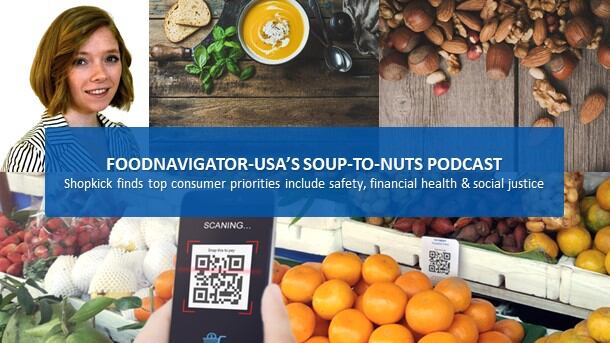According to consumer research conducted by the rewards and marketing app Shopkick earlier this month and since the pandemic began, the lockdowns instituted at the start of the coronavirus pandemic pushed three-quarters of Americans to adjusted their habits – including where, when and how they shopped, and what they bought. A year later, Shopkick says, the pandemic continues to influence how Americans buy groceries and other goods.
As a result, Jaysen Gillespie, EVP of data and analytics at Shopkick, explains in this episode of FoodNavigator-USA’s Soup-To-Nuts podcast, retailers and brands must remain vigilant by constantly tracking fresh data, and be ready to pivot quickly as they have had to so many times over the past year. He also shares details on how consumer behavior has changed over the past year and strategies for how brands and retailers can best respond to better service their customers going forward.
[Editor’s note: Never miss another episode of FoodNavigator-USA’s Soup-To-Nuts podcast – subscribe online.]
‘We’re a full funnel player on the marketing side’
As part of Shopkick’s commitment to helping brands, retailers and shoppers navigate the pandemic, Gillespie explained the platform surveyed thousands of people nationwide who use it to earn rewards or ‘kicks’ for engaging with products. The surveys, conducted over the past year, look at how the coronavirus and other current events influence shopper behavior and attitudes.
“We’re a rewards app that lets people earn points or kicks, as we call them, hence the name Shopkick, for doing various activities” that help marketers build awareness and engagement, Gillespie said. “One of the things that we regularly do in the app is talk to consumers” through surveys about how they feel about products or shopping more broadly.
Heightened focus on health and safety remains paramount
One of the earliest – and most persistent changes in consumer behavior during the pandemic uncovered by Shopkick was a heightened focus on health and safety, which the most recent survey reveals likely will remain a top priority for many Americans even as the vaccine continues to roll out.
“What’s interesting about that is that while there appears to be some debate among the political classes, among the actual buying public there’s very little debate. Seventy-nine percent of consumers expect retailers to continue to enforce health and safety restrictions,” including face coverings, social distancing and caps on shoppers allowed in stores at one time, Gillespie said.
In addition to setting high ongoing safety expectations of retailers, most consumers will hold themselves to the same bar.
Shopkick found 96% of vaccinated consumers and 97% who plan to be vaccinated also plan to continue taking personal safety precautions while shopping in-store, including 93% who will wear face coverings, 87% who will use disinfectants and 66% who will shop at off-peak times.
One reason for the resolute focus on safety measures could be concern that not enough people will be vaccinated quickly enough to create heard immunity. According to a Shopkick survey conducted in early March, 8% of respondents were vaccinated and 48% planned to receive it, but 44% did not plan on being inoculated against the coronavirus.
But what this means for retailers is they have permission and support to enforce safety measures.
BOPIS (buy online, pickup in store) remains popular
To reduce exposure during the pandemic, many shoppers shifted their shopping habits to include less frequent trips and ordering groceries online for delivery or pick-up, which Gillespie says will continue to remain popular going forward.
For example, Shopkick’s March survey found 49% plan to continue taking fewer but bigger shopping trips, 49% to shop online more and 10% will use buy-online-pickup-in-store options more.
But, Gillespie notes, this doesn’t mean in-store shopping will go away. Rather, consumers will adopt an omni-channel approach that includes both online and in-store shopping.
“What you’re seeing is there’s a spectrum here,” he explained. “At the one end of the spectrum, I’ve got a crying nine month old and I’m out of diapers. I’m not doing BOPIS [buy online, pickup in store]. I’m going to a store and I’m getting diapers. I need those diapers in 10 minutes. On the other end of the spectrum, I’m buying a new TV unit. I’ve been thinking about this thing for two years. I don’t care if it takes six weeks to ship… I’ll just buy it online.”
Brands leverage promotions as loyalty shifts
One trend that emerged during the pandemic, but which may be reverting is consumers’ wavering attitudes and loyalty to brands.
At the beginning of the pandemic, Shopkick found 80-85% of consumers said they were less brand loyal as they simply tried to stock their shelves. But the most recent survey in March revealed that number dropped to 38%. So, while brand is still less important than before the pandemic, it is recovering.
As brands fight to either regain or maintain new consumers gained during the pandemic, many are bringing back promotions – which Gillespie notes mostly stopped during the early months of the pandemic, but which now can be a powerful tool.
Promotions also will be valuable to consumers in the lower arm of the ‘K-shaped’ economic recovery, and could help brands gain loyalty among shoppers most hard hit financially by the pandemic’s fallout.
Money isn’t everything – pandemic accelerates conscious capitalism
As influential as money is on purchase decisions, it isn’t everything. Brands’ and retailers’ values also influence what consumers buy, according to Shopkick data, which found 68% of Americans claim the pandemic has made them more conscious consumers.
Shopkick’s March survey found 39% of respondents report researching whether their values align with a brand’s or company’s values before buying from them. In addition, 11% say they are supporting more BIPOC-owned businesses and 65% say they are keeping it local, which includes foregoing online shopping for 8% of respondents and skipping Amazon.com for 8%.
Giellespi notes there is a very strong correlation between a shopper’s age and how important it is that their values align with a brand’s or retailer’s.
For example, Shopkick found 55% of Gen Z shoppers are most likely to shop more at retailers or buy brands that align with their values, followed by 47% of Millennials, 45% of Gen Xers and 41% of Baby Boomers.
Data can shape strategy
As brands continue to navigate rapidly changing social values and the uneven economic recovery, Gillespie says their best bet is to remain flexible and invest in fresh data, which Shopkick can help provide, as this will reflect the impact of rapid change and influence their next moves.
“Things are starting to get better across the board, but it’s a little bit of a wait and see and a little bit of touch and go in 2021. I think the key for brands and retailers is going to be maintain your flexibility, maintain your agility, keep on top of data points and adjust as needed. This isn’t the year to fall back on annual planning syndrome,” Gillespie said.
Rather than trying to predict the next 12 months, he recommends looking one to three months out and using fresh data to continually tweak business strategies.
Ultimately, while Gillespie notes we are not out of the woods yet, he is optimistic that with the right tools, including data and the vaccine, the US economy will turn around and brands and retailers can expected brighter days ahead.




